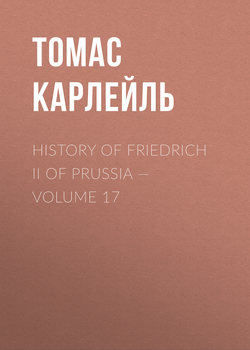Читать книгу History of Friedrich II of Prussia — Volume 17 - Томас Карлейль - Страница 5
Book XVII—THE SEVEN-YEARS WAR: FIRST CAMPAIGN.—1756-1757 Chapter II.—ENGLISH DIPLOMACIES ABROAD, IN PROSPECT OF A FRENCH WAR THERE HAS BEEN A COUNTER-TREATY GOING ON AT VERSAILLES IN THE INTERIM; WHICH HEREUPON STARTS OUT, AND TUMBLES THE WHOLLY ASTONISHED EUROPEAN DIPLOMACIES HEELS-OVER-HEAD
ОглавлениеTo expectant mankind, especially to Vienna and Versailles, this Britannic-Prussian Treaty was a great surprise. And indeed it proved the signal of a general System of New Treaties all round. The first signal, in fact,—though by no means the first cause,—of a total circumgyration, summerset, or tumble heels-over-head in the Political relations of Europe altogether, which ensued thereupon; miraculous, almost as the Earthquake at Lisbon, to the Gazetteer, and Diplomatic mind, and incomprehensible for long years after. First signal we say, by no means that it was the first cause, or indeed that it was a cause at all,—the thing being determined elsewhere long before; ever since 1753, when Kaunitz left it ready, waiting only its time.
Kaiser Franz, they say, when (probably during those Keith urgencies) the joining with France and turning against poor Britannic Majesty was proposed in Council at Vienna, opened his usually silent lips; and opined with emphasis against such a course, no Kaunitz or creature able to persuade Kaiser Franz that good would come of it;—though, finding Sovereign Lady and everybody against him, he held his peace again. And returned to his private banking operations, which were more extensive than ever, from the new troubles rising. "Lent the Empress-Queen, always on solid securities," says Friedrich, "large sums, from time to time, in those Wars; dealt in Commissariat stores to right and left; we ourselves had most of our meal from him this year." [OEuvres de Frederic, iv. 8.] Kaiser Franz was, and continued, of the old way of thinking; but consummate Kaunitz, and the High Lady's fixed passion for her Schlesien, had changed everybody else. The ulterior facts are as follows, abbreviated to the utmost.
September 22d, 1755, a few days before Hanbury's Subsidy-feat at Petersburg, which took such a whirl for Hanbury, there had met for the first time at Versailles, more especially at Babiole, Pleasure-House of the Pompadour, a most Select Committee of Three Persons: Graf von Stahremberg, Austrian Ambassador; Pompadour herself; and a certain infinitely elegant Count and Reverence de Bernis (beautiful Clerico-Mundane Gentleman, without right Benefice hitherto, but much in esteem with the Pompadour);—for deepest practical consideration in regard to closure of a French-Austrian Alliance. Reverend Count (subsequently Cardinal) de Bernis has sense in Diplomacy; has his experiences in Secular Diplomatic matters; a soft-going cautious man, not yet official, but tending that way: whom the Pompadour has brought with her as henchman, or unghostly counsellor, in this intricate Adventure.
Stahremberg, instructed from home, has no hesitation; nor has Pompadour herself, remembering that insolent "JE NE LA CONNAIS PAS," and the per-contra "MA COUSINE," "PRINCESSE ET SOEUR:"—but Bernis, I suppose, looks into the practical difficulties; which are probably very considerable, to the Official French eye, in the present state of Europe and of the public mind. From September 22d, or autumnal equinox, 1755, onward to this Britannic-Prussian phenomenon of January, 1756, the Pompadour Conclave has been sitting,—difficulties, no doubt, considerable. I will give only the dates, having myself no interest in such a Committee at Babiole; but the dates sufficiently betoken that there were intricacies, conflicts between the new and the old. Hitherto the axiom always was, "Prussia the Adjunct and Satellite of France:" now to be entirely reversed, you say?
